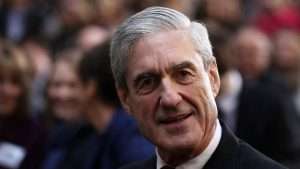The Volokh Conspiracy
Mostly law professors | Sometimes contrarian | Often libertarian | Always independent
Vox Symposium on the Mueller Report
The symposium includes contributions by a variety of legal commentators, including fellow VC blogger Keith Whittington and myself.

The Vox website has an insta-symposium on the Mueller report, with contributions by a variety of legal commentators, including Volokh Conspiracy co-blogger Keith Whittington and myself. I think Keith had the best one-line take on the report: "If this is what a complete and total exoneration looks like, I'd hate to see a damning report."
Here is an excerpt from my own, admittedly less eloquent, contribution:
The…Mueller report released today paints an unflattering picture of President Trump, particularly on the question of obstruction of justice. Although special counsel Robert Mueller did not reach any conclusion on whether the president should be prosecuted for obstruction, he did conclude that "Our investigation found multiple acts by the president that were capable of exerting undue influence over law enforcement investigations, including the Russia-interference and obstruction investigations."
Trump's efforts to hamstring the investigation mostly failed. But that was "largely because the persons who surrounded the president declined to carry out orders and accede to his requests." The fact that White House counsel Donald McGahn and other legally sophisticated officials refused to carry out the president's orders is a strong sign they considered them improper and likely illegal.
The report also includes a compelling response to claims that the president could not have committed obstruction of justice, if he did not commit any underlying crime related to Russia. As the report notes, "obstruction of justice can be motivated by a desire to protect non-criminal personal interests, to protect against investigations where underlying criminal liability falls into a grey area, or to avoid personal embarrassment."
All of these motives were very plausibly present in the case of Trump….
An additional possible motive was preventing revelation of crimes by his close associates that were not directly related to "collusion." The Mueller investigation did in fact reveal many such crimes….
On the question of collusion, the report is largely good news for Trump. The investigation did not find enough evidence to justify filing charges. But the report documents extensive contacts between the Trump campaign and Russian agents. The latter sought to help the former, and the campaign hoped to benefit from Russia's actions. The fact that a hostile authoritarian regime believed Trump's victory would advance their interests, and made extensive efforts to secure that outcome, is highly damning, even if Trump and his associates did not commit any crimes in the process.
It's also worth noting that the report includes a detailed critique of claims that the president, by virtue of his constitutional prerogatives, cannot commit the crime of obstruction of justice. I think that this section is largely correct, though advocates very broad conceptions of executive power will surely differ. And it is unlikely Mueller would have included it if he thought that Trump did nothing illegal.
As noted in my contribution, Trump is in little danger of immediate legal jeopardy. Justice Department policy forbids prosecution of a sitting president, and Attorney General Barr has repeatedly indicated he thinks the president did not commit any crimes. But a future attorney general could potentially differ with that view, and a prosecution might then be initiated when Trump leaves office. Impeachment is also potentially on the table, though I think it is highly unlikely that there will be enough votes to convict (which would require the support of numerous GOP senators).
Finally, all those who comment on the report within a few hours of its publication—myself most definitely included—take the risk of overlooking something important. It's entirely possible that a more careful reading will yield greater insight and lead us to reconsider some of our initial reactions, including my own. We should be open-minded about that possibility.
To get the Volokh Conspiracy Daily e-mail, please sign up here.

Show Comments (176)